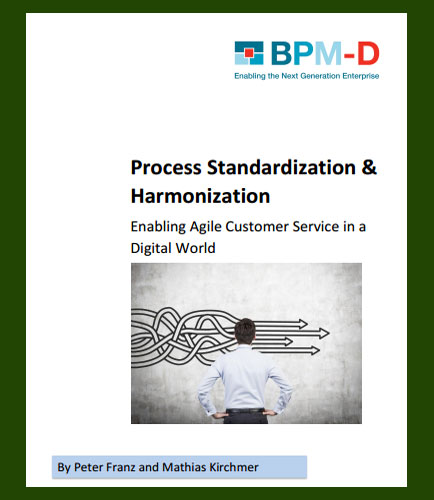
PROCESSING. PLEASE WAIT...


White Paper: BPM-D
Why has standardization and harmonization in Business Process Management become so much more important in this digital world?
Measuring success of standardization and harmonization initiatives has a dramatic impact on BPM enablers. But complex market conditions combined with digitally empowered consumers present a challenging commercial environment.
So, how can you achieve this?
When processes are aligned and good practices are applied, efficiencies are created, freeing people to innovate. In order to achieve this alignment and efficiency, standardization and harmonization of business processes is important.
This whitepaper guides you on all five of these critical areas in the context of standardization and harmonization and actions to be taken to improve standardization and harmonization in business processes.
What’s inside this whitepaper?
What are the business process standardization and harmonization in BPM?
Standardization of processes benefits.
The Process Implementation Challenge.
Adopting Standard Business Processes – Fast at low risk.
Process Governance, Process Knowledge Management, People Engagement.
By: Integrated Business Systems
Orchestrating an effective business continuity solution requires understanding an organization’s distinctive needs and designing a system to accommodate them. With so many moving parts, this process can be challenging. This whitepaper provides insights on how organizations can mitigate the risks by having a business continuity plan in place. Key takeaways from this whitepaper: 5 basic building blocks that is necessary for successful business continuity A note on data loss, downtime and the cloud Proper planning can protect against devastating losses Requirement for orchestrating an effective business continuity solution
By: Signavio
An enterprise-wide process modeling is the most agile way to conduct a successful digital transformation as it requires a top-down examination of the performance, quality and sustainability. Digital transformation is an essential step in the evolution of many businesses today. Process modeling has grown from creating a diagram or report figure that explains a business problem to a transformational practice that can organize the way a business is monitored, controlled, and measured. This whitepaper discusses why businesses should consider an enterprise-wide process modeling approach for competing through digital transformation. Key takeaways of this white paper: Take Process Models out of isolation within your business Nurturing digital business transformation by focusing on your process From business process mapping to enterprise business process modeling Ways to instigate enterprise-wide process modeling


 2026 All Rights Reserved | by: www.ciowhitepapersreview.com
2026 All Rights Reserved | by: www.ciowhitepapersreview.com